Shifts during Covid-19
The survey that was drawn on to identify the seven segments was conducted before the Covid-19 outbreak, but the detailed qualitative work (discussion groups and individual interviews) was conducted in the wake of the pandemic. Two waves of additional Covid-19 polling were integrated into these analyses to ensure a complete picture of public opinion across the segments.
May 2021 update: Climate Outreach, as a core partner of the Centre for Climate Change and Social Transformations (CAST), conducted a nationally representative survey of 1,500 UK residents in December 2020. The survey used the Britain Talks Climate insights to look at what we can learn from people’s shared experiences over the last year, and how public engagement on climate change can build on these. The findings have been distilled in a guide which offers eight recommendations.
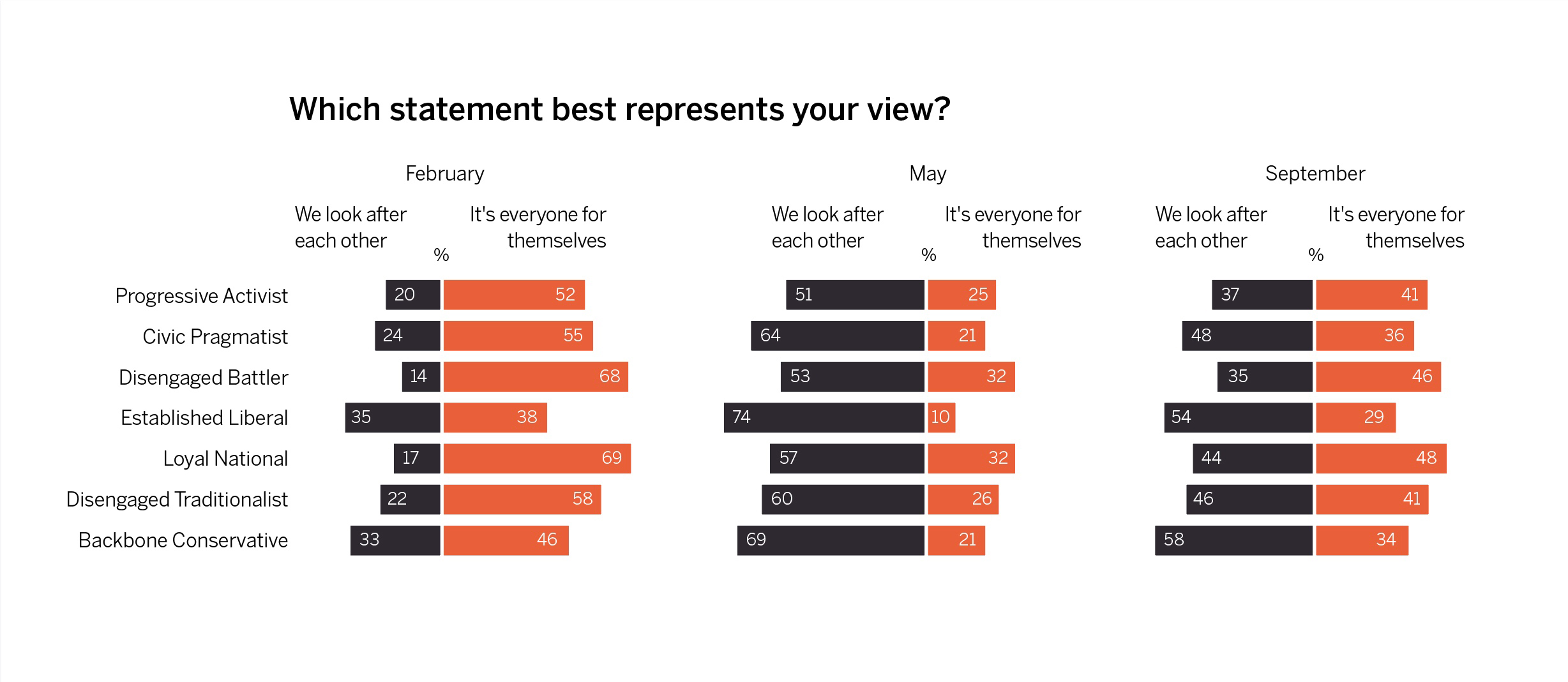
Percentage of people agreeing that “we look after each other” in February (left), May (centre), and September (right)
In a fast-moving landscape, keeping tabs on how the seven segments are feeling during the Covid-19 pandemic is critical. In a striking comparison between pre-pandemic public opinion (February) and views in May after the outbreak of Covid-19, there was a major shift in the balance of people agreeing that we look after each other, when thinking about life in the UK in 2020, with every segment showing positive movement.
Although this positive shift had softened by the time the question was asked again in September – representing, perhaps, fatigue and frustration with the continuing constraints of Covid-19 policies – levels remain higher than they were before the pandemic for all segments, and significantly so for the least politically engaged, Disengaged Battlers and Disengaged Traditionalists. In a comparison with other European countries, this feeling of social solidarity appears to be more enduring in the UK.
Another clear and consistent finding across the segments is that people don’t want to go ‘back to normal’. In May, a clear majority in all segments agreed that they hoped for things to change, rather than going back to how they were before the Covid-19 crisis. In September, there was a slight decline but a large majority still hopes for change. Some segments show a marked drop in agreement, however – Disengaged Traditionalists (-21%), Backbone Conservatives (-18%) and Loyal Nationals (-16%) – suggesting perhaps a longing for the (relative) comforts of a time before lengthy lockdown restrictions and economic instability.
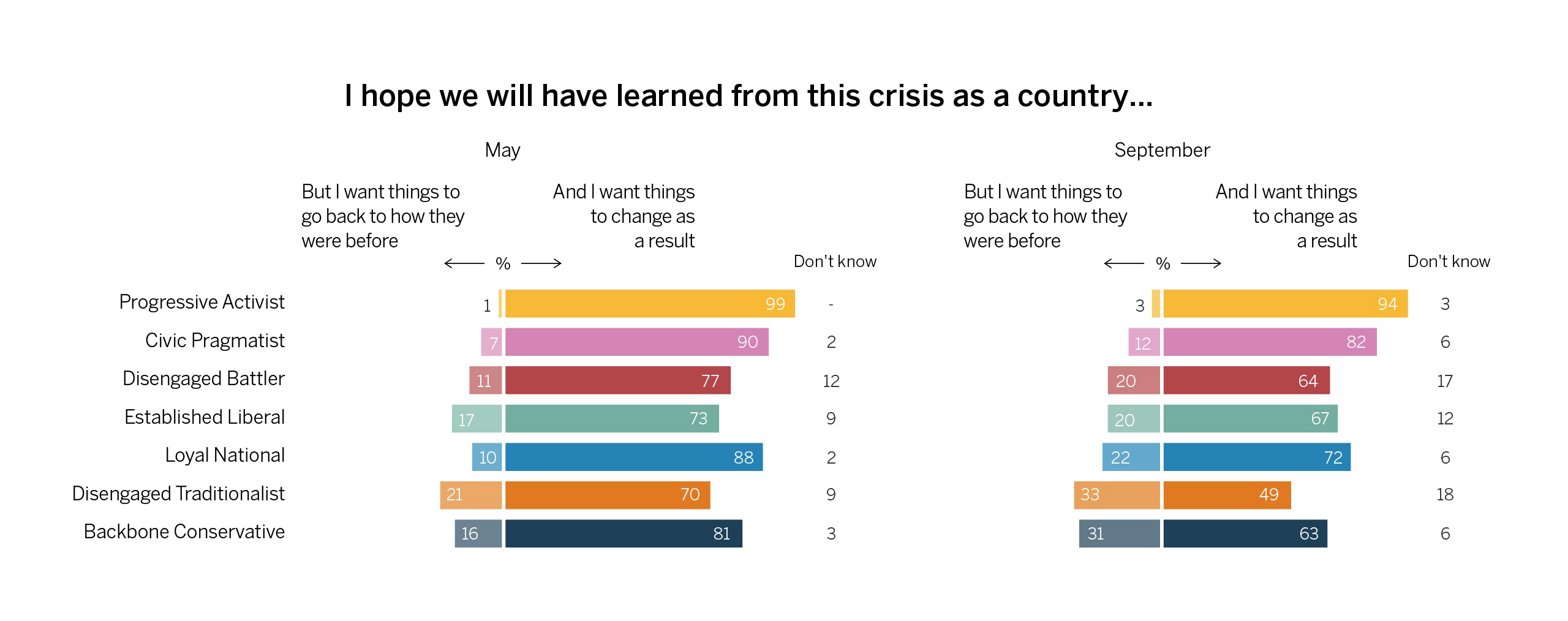
Percentage of people who want things to change vs. go back to how things were before in May (top) and September (bottom) (All segments show decreases in wanting to change, with the largest difference being for the right-leaning segments and ‘Disengaged’ groups.)
Across the seven segments, lockdown policies drove concerns about the future, with a focus on health, being able to see friends and family, and government decision-making. Progressive Activists and Civic Pragmatists were particularly worried about the government not using this moment to change the way we think about and plan for the future. There is a clear difference between Established Liberals and the two ‘Disengaged’ segments in how secure they feel about future employment, creating a risk that the segments could shift further apart as the financial impacts of Covid-19 play out.
Across the segments, there is a recognition of the (unintended) positive aspects of lockdown policies – cleaner air and louder birdsong – leading to an understanding that we need to reduce the number of vehicles on the road and protect our green spaces.
Some behaviours have predictably decreased, such as taking fewer trips abroad for work or pleasure (54%), driving less (51%), and buying fewer things (40%). Other notable changes include a universal increase in the appreciation of nature, shopping from local businesses, buying local and seasonal food, and reducing waste.
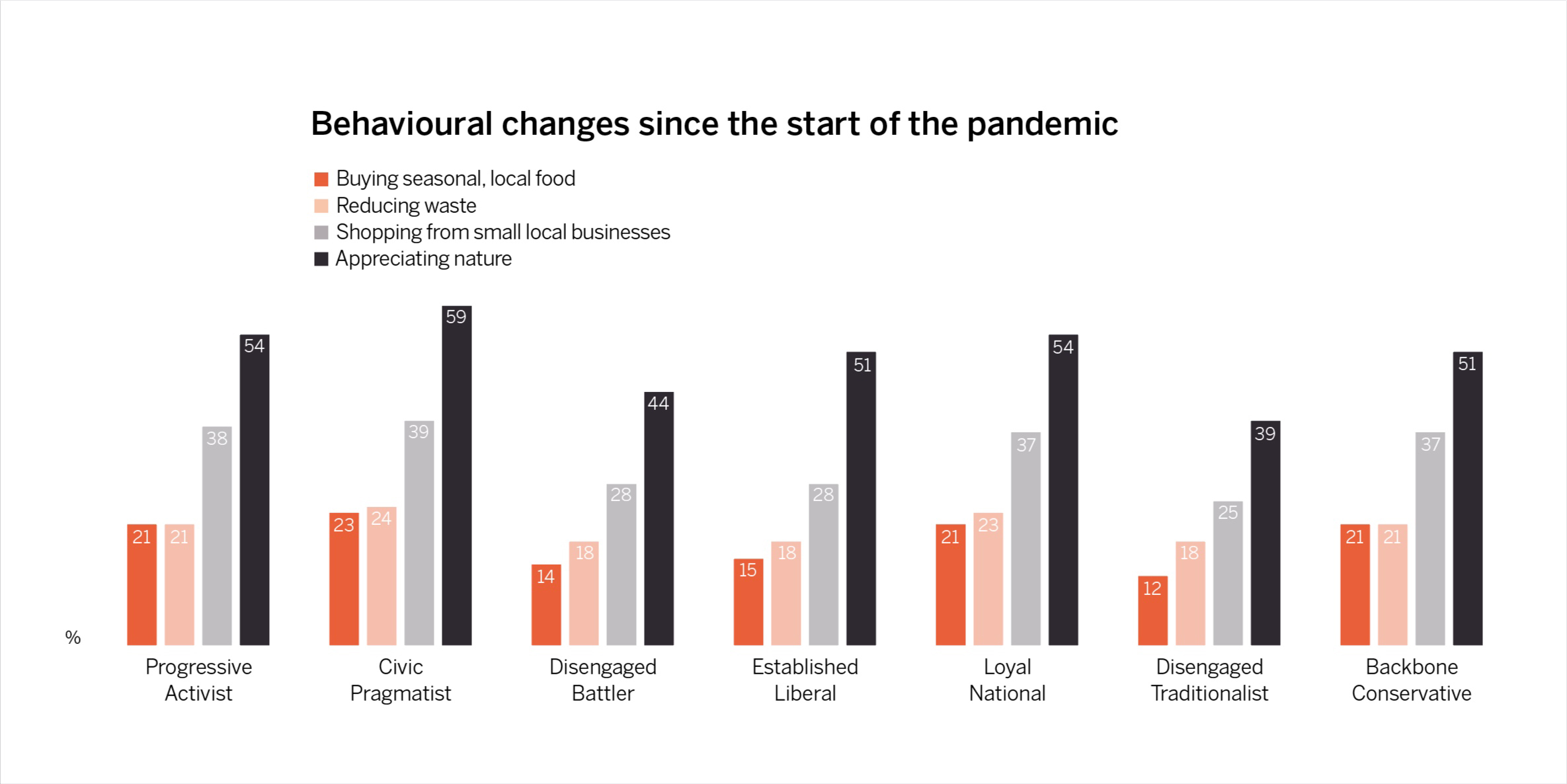
Behaviours that have increased since the onset of the pandemic
But it is harder to judge whether fear is dominating hope in the life of individuals. In May, the most optimistic segments (Established Liberals and Backbone Conservatives) were more hopeful about a post-Covid-19 future, whereas the most pessimistic segments (Progressive Activists and Disengaged Battlers) were the most fearful. In September, this picture shifted slightly, with decline in hope among the more optimistic segments, but also a decline in fear, alongside much greater uncertainty (“don’t know” responses), particularly among the two ‘Disengaged’ segments. Interestingly, there has been a shift towards greater hope only among Disengaged Battlers, with Established Liberals showing the largest decline in hope, related to a substantial increase in uncertainty.
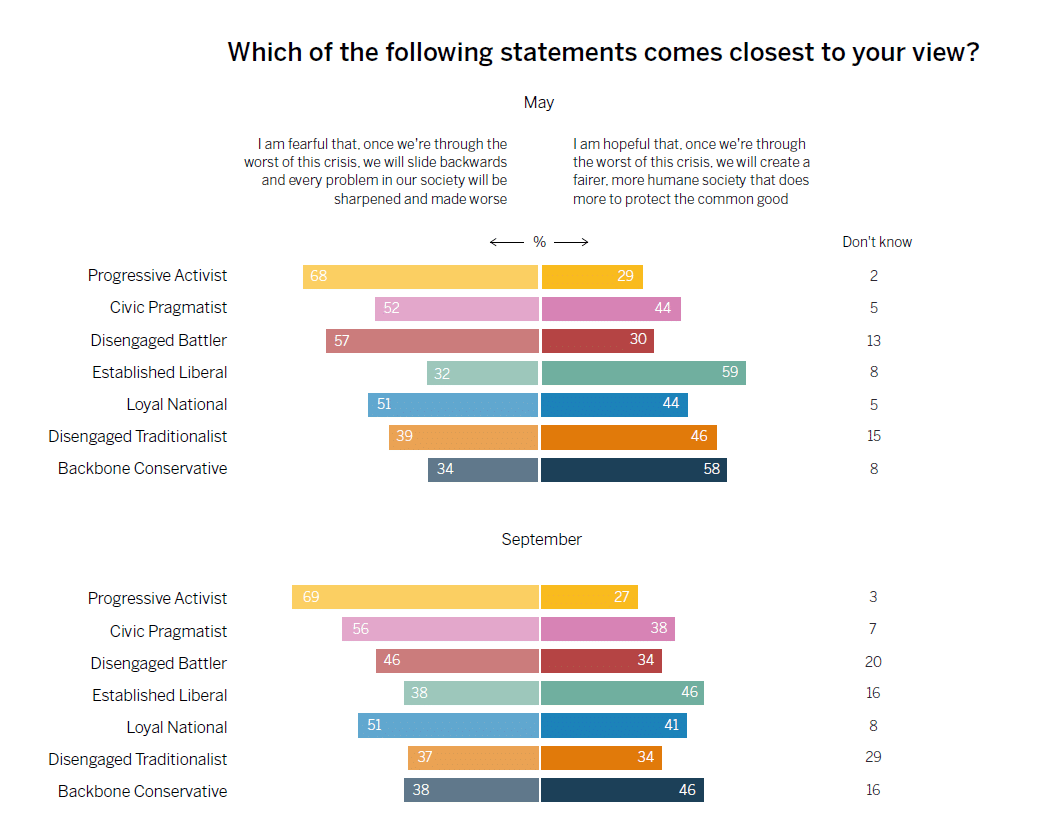
Percentage per segment that is hopeful or fearful about the future, in May and September
Tellingly, only Progressive Activists recognise any direct link between environmental damage and the spread of infectious disease, so campaigns that explicitly make this link are unlikely to resonate with most. In fact, the more conservative-leaning segments were slightly less convinced of the link in September than they were in May.
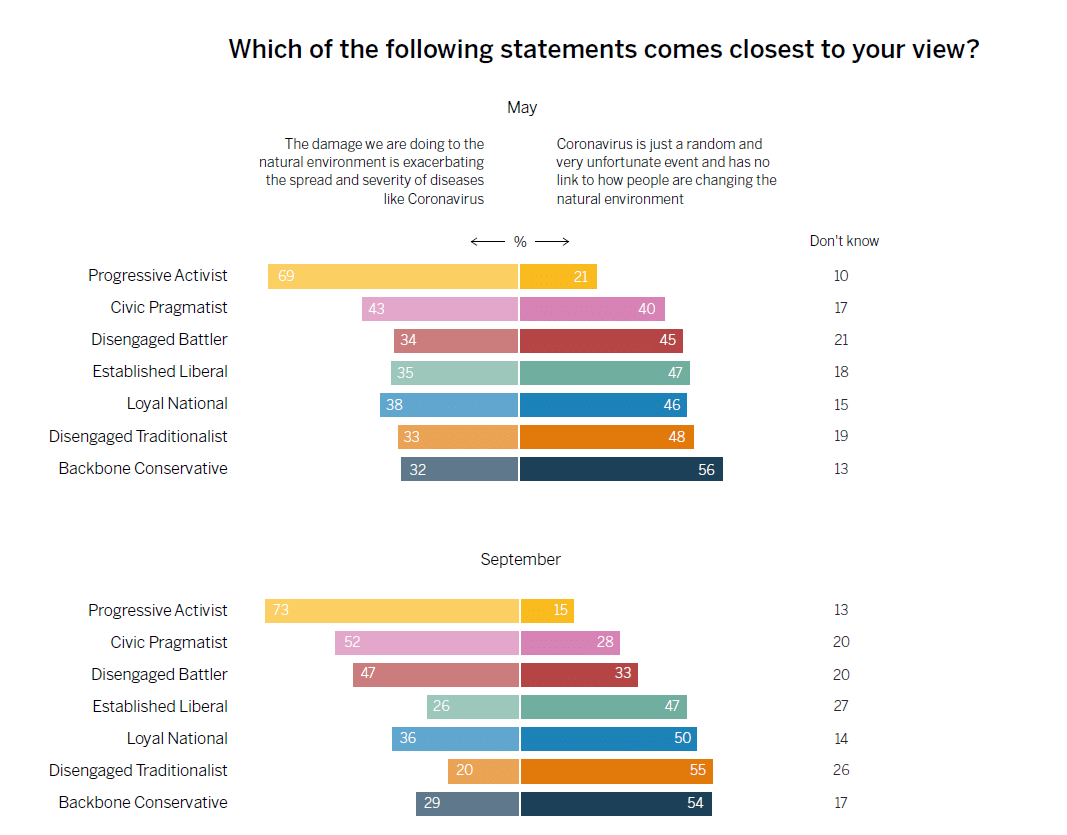
Percentage of each segment that sees a connection between Covid-19 and the natural environment, in May and September
The Covid-19 crisis has increased concern about the economy and jobs, causing the environment and climate change to drop slightly in the priority list for Civic Pragmatists, Disengaged Battlers, Established Liberals and Loyal Nationals.
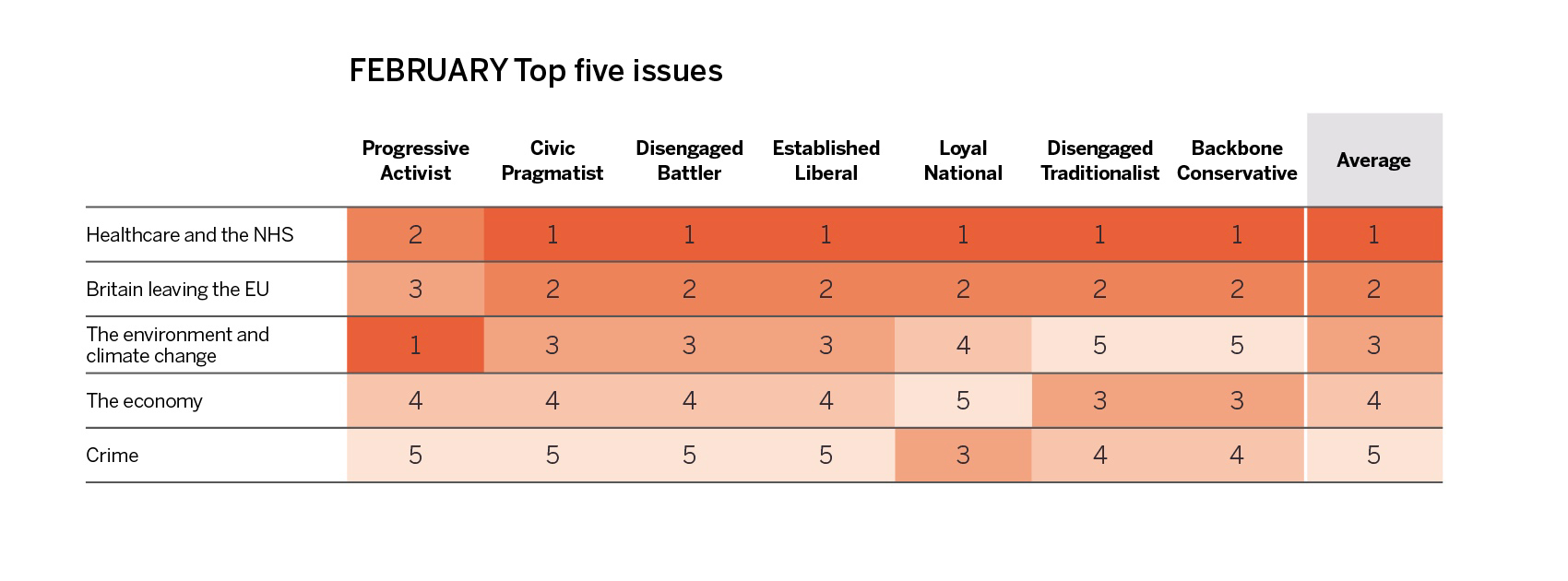
Top five issues – February 2020
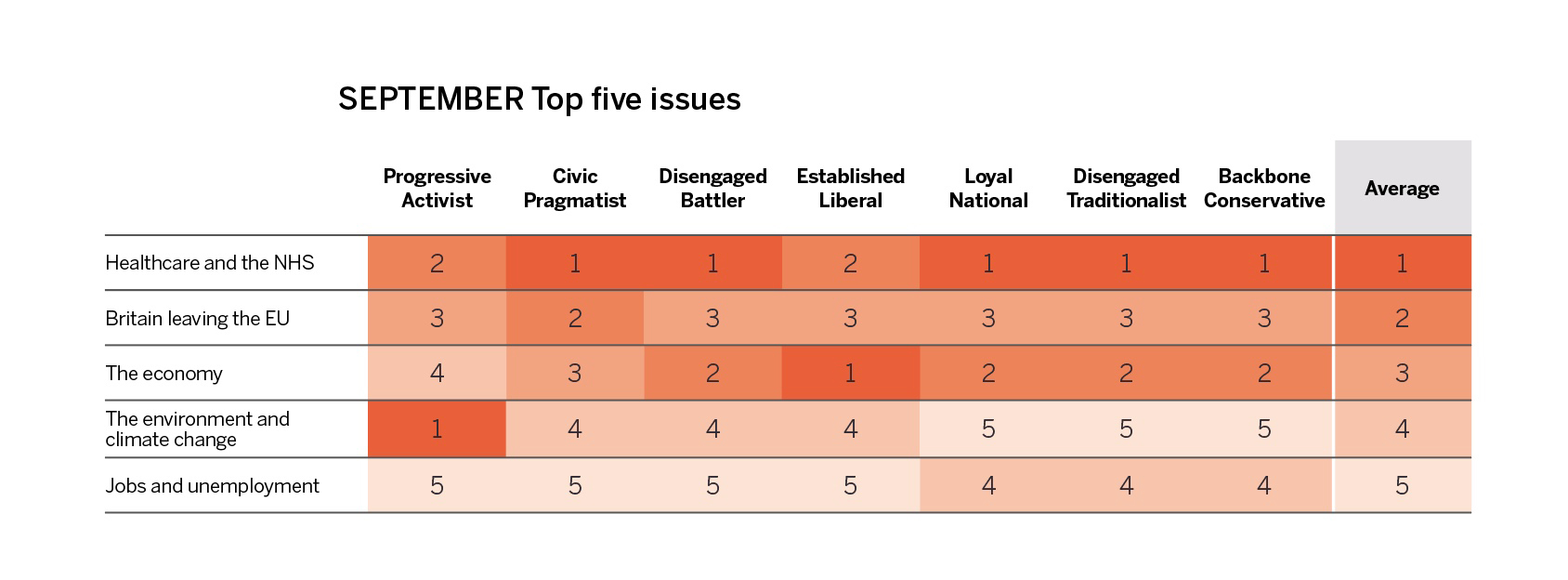
Top five issues – September 2020
Despite this, a majority in every segment, except the Disengaged Traditionalists, who mostly want things to remain the same, would like to see more climate action from the political party they voted for in 2019. Across the board, there is also extremely low support for less action from political parties, indicating that policymaking needs to catch up with public desire.
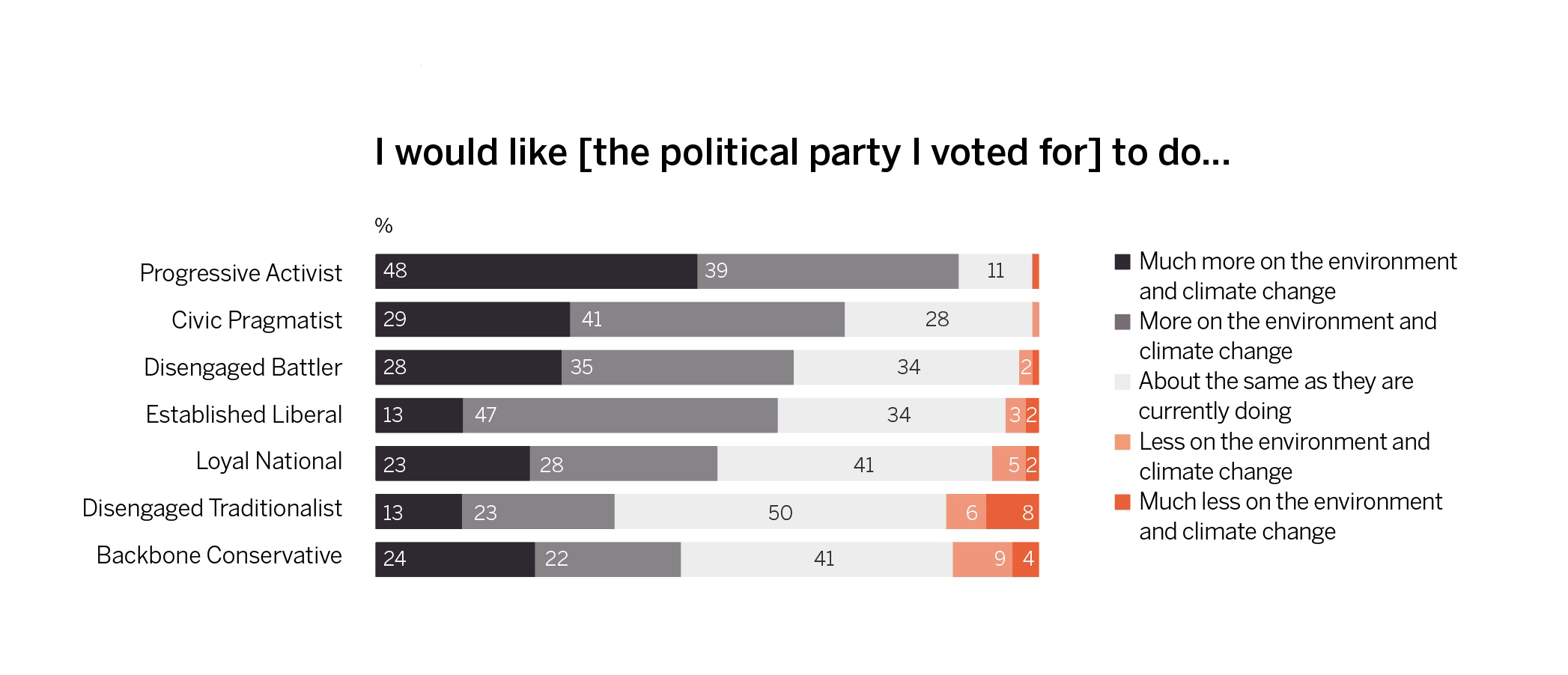
Desire for greater political action on the environment and climate change
Brexit remains the second most important issue overall, and it appears that the country’s response to Covid-19 has not convinced the majority of segments that political division is lessening (most believe it is getting worse).
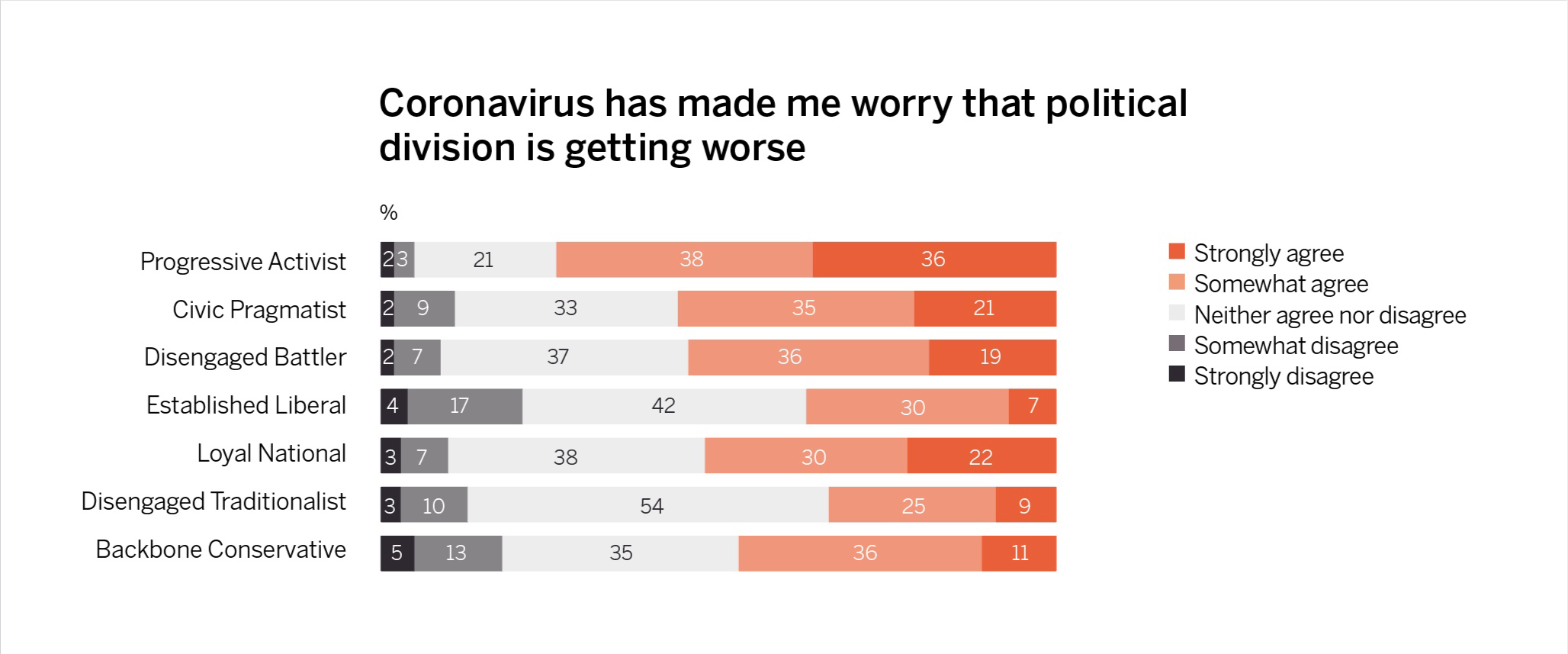
Concern about greater political division due to Covid-19
Despite climate falling slightly in overall priorities, there are some positive shifts, including segments’ responses to the notion of a ‘green recovery’. In May, Progressive Activists were the only segment to indicate strong support for the idea of using public money to support low-carbon industries as part of the Covid-19 recovery. In September, we saw increased support for this among Civic Pragmatists (+25%), Backbone Conservatives (+14%) and Loyal Nationals (+12%).
A broad-based belief in the potential for climate policies to create jobs already exists, and the changes noted above are a reason for cautious optimism about the direction of travel. However, there is work to be done to persuade groups across the whole of society of the value of a green recovery for them. Support remains low among the two ‘Disengaged’ segments, who are the least likely to believe that they will benefit from low-carbon employment opportunities.
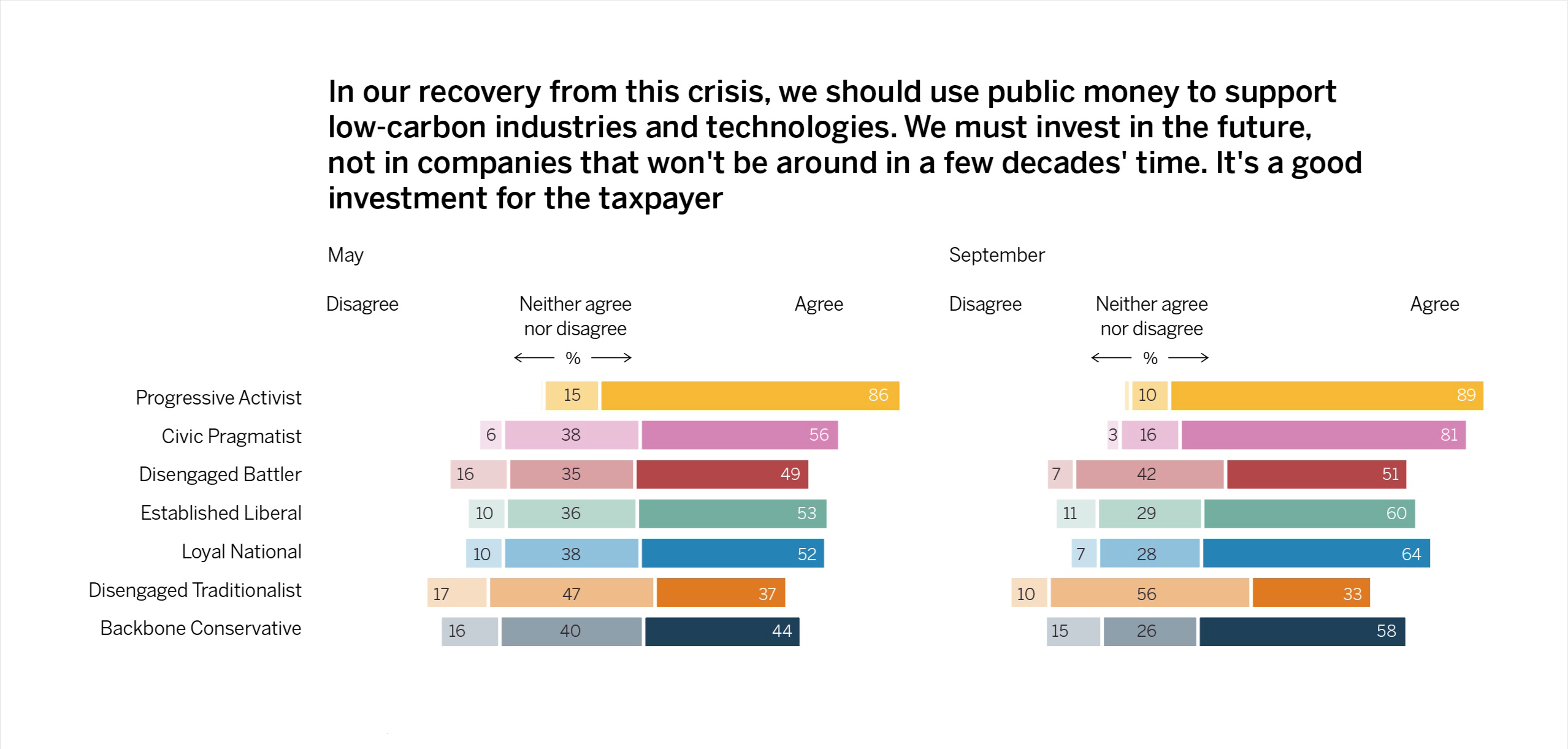
Percentage of people endorsing a green recovery in May and September
All segments, except the Backbone Conservatives, disagree that the actions of the UK government during the pandemic have shown they can be trusted to look after the people of this country. In addition, a majority of Progressive Activists and Civic Pragmatists say that the government response showed that they don’t care about people like me.

Trust in UK government’s handling of pandemic
Majorities across most segments indicated that they wish they had more say in the direction the country takes. The exceptions are Established Liberals and Backbone Conservatives, who are the most politically empowered already, and Disengaged Traditionalists, who tend to have higher levels of authoritarianism and belief that the country is going in the right direction.
Segment specific insights for Covid-19
Progressive Activists
The people who are most affected by the coronavirus are the disadvantaged, the immigrant community, and people who are working class. Because it comes back to what I said before. They are forming the majority of the vital services that we are now totally and utterly relying on. So, yes, our divisions are becoming more and more exposed.”
During the first lockdown, there was strongest agreement (78%) among this segment that, although Covid-19 is a national emergency, it is critical to tackle climate change at the same time, even if it costs more in the short term. In September, this sentiment increased to 92%.
They are most strongly in support of using public money to support low-carbon industries and technologies as we recover from the Covid-19 crisis. Sentiments about using Covid-19 as an opportunity for change are prevalent across this segment.
This is being treated as an existential crisis and we’ve gladly shut down our economy for the sake of saving – I mean, the number of lives being lost by the potential of an environmental calamity will be exponentially higher than what we’re going to experience this year from this pandemic. The reactions we’ve had from governments across the world in addressing that does hopefully give a bit of hope that they could have a similar response and enact certain policies and we would have that collective awareness of the impact of what we’re doing, that it might be inspirational to alleviate some of the environmental issues that we’re having come forth.”
Despite being exhausted by the division in politics, Progressive Activists retain some hope that Covid-19 could be a stepping stone towards building back better, not only for the environment, but in terms of a better society.
I think the hope is that we learn from what we’re going through at the moment and we produce something better. I would make an analogy that our parents and grandparents went through two world wars and we built a welfare state and a dream for a better life out of that.”
The absolute best case scenario would be ... that having gone through various difficulties, people said, ‘right, no more of that’ and built a better society. We have learnt in the past month or so just what is possible. People sleeping rough have been housed. That was impossible until it was possible.”
I think that this is an opportunity to maybe set the standard for the world and say, ‘we’re a diverse country, this is how to do things’, and maybe get a bit of respect.”
Backbone Conservatives
Backbone Conservatives are unlikely to be persuaded by messages that position climate change as an emergency. Even before the Covid-19 pandemic, they were, after Disengaged Traditionalists, second least likely to agree that climate change requires urgent (38%) over gradual (48%) societal action.
I just think a lot of the other issues are far more important at the moment. Particularly with things like Covid-19 at the moment, the environment has very faded into the background. It was something that was very high on people’s agendas previously but actually now isn’t even being discussed at the moment.”
They are the segment most likely to agree that if climate change was as bad as some people claim, governments would already be doing much more about it (71%), perhaps reflecting their high levels of trust in political institutions. In May, they were the second most likely segment, just behind the apathetic Disengaged Traditionalists, to agree with deprioritising climate change in the recovery from Covid-19: Coronavirus is a national emergency and we must put all other issues on the backburner to deal with it, including climate change (52%). That said, 44% felt differently – that Coronavirus is a national emergency but we must not forget about other emergencies and make sure we’re tackling climate change at the same time.
Perhaps due to changing perceptions of the urgency of the Covid-19 crisis, by September this had flipped for Backbone Conservatives and other segments, who are now more likely to agree that we must not forget about other emergencies, such as climate change (53%), instead of putting all other issues on the backburner to deal with Covid-19 (39%).
Backbone Conservatives are persuadable on climate change, but are only likely to respond well to carefully crafted approaches that emphasise pragmatism and the preservation of the countryside, avoid environmentalist rhetoric, and offer positive, constructive narratives that foreground the need for people to take responsibility for themselves, without assuming everyone else will want to make identical decisions.
I’ll tell you the truth, I don’t really talk about it with people much. I mean I just tend to do my thing and they do their thing really. I wouldn’t try and preach to anybody about it because I don’t really think that’s my right to do that really. I let them live their own life."
They are less likely to agree with policies that curb industries. For instance, Backbone Conservatives show the second lowest agreement with the government only giving bailout support to polluting companies like airlines and car makers if they make major changes to become more environmentally-friendly (46%). Messages about growing the UK’s green industries to avoid reliance on countries like China, on the other hand, receive almost universal support (94%), higher even than Progressive Activists or Civic Pragmatists.
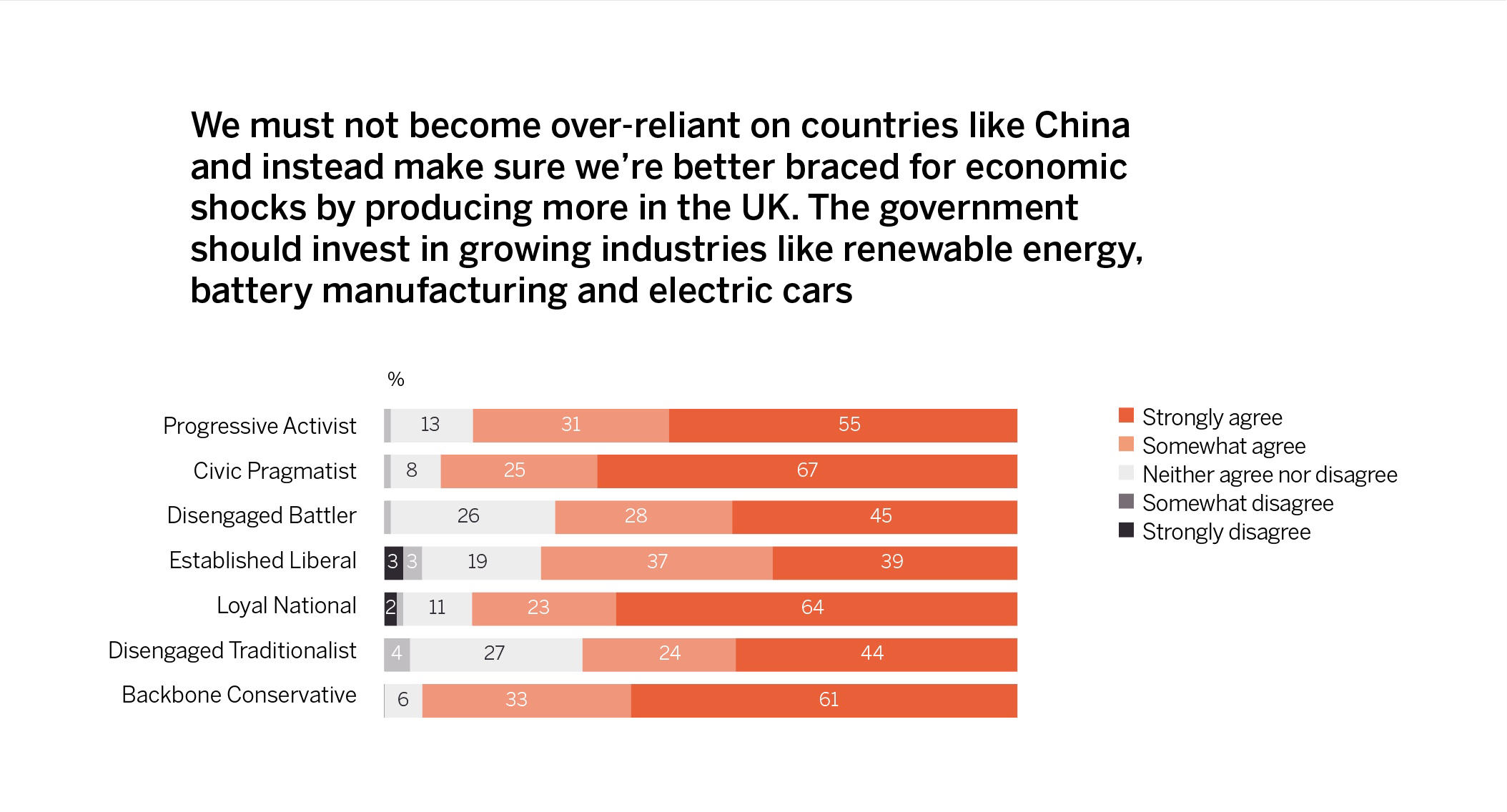
Agreement and disagreement with investing in green industries to reduce over-reliance on foreign countries.
Civic Pragmatists
Alongside many other segments, Civic Pragmatists recognise that lockdown policies have inadvertently ‘improved’ the environment in some ways:
At the current state of things, seeing air pollution drop, the number of cars on the road drop, the birds singing louder than they did before, has just kind of shown the effect that humans have on the environment, just on very shallow scale really and so the environment is something that I am concerned about, I guess.”
I feel it’s been great to actually hear the birds singing in the morning rather than hearing the cars and the pollution. It has given me an appreciation of the environment which I did not have before. And actually, to finally get out of my car and use my two legs more than I have ever done. It has changed my outlook and my focus that we should have more green spaces ... that green space has become so much more important to me and my family than it has ever before.”
Civic Pragmatists recognise that the outbreak of Covid-19 is related to damage to the natural environment, but only by a small margin (39% in May, 52% in September). Similarly, although they agree that climate change should be prioritised (rather than put on the ‘backburner’) in our response to the pandemic, they are not persuaded of this to the same extent as Progressive Activists (reflecting their milder level of commitment to the climate cause overall).
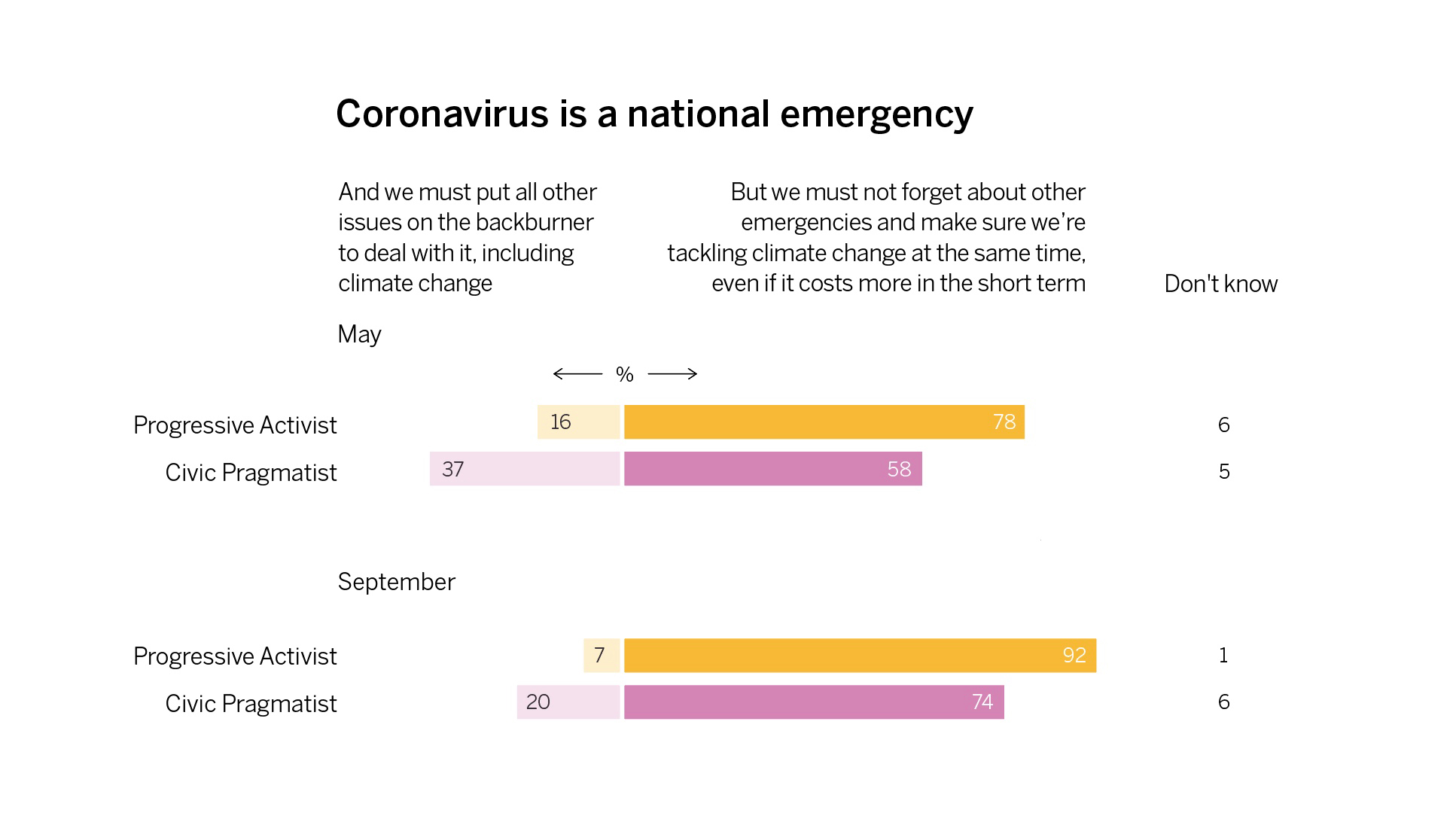
Prioritisation of climate change vs. Covid-19: Progressive Activists and Civic Pragmatists between May and September
The two segments are united in the belief that – once the pandemic is over – they do not want things to go ‘back to normal’. Relating this view back to their feelings of anxiety about the increasingly dangerous state of the world, this segment sees an opportunity to ‘reset’ the polarisation that has defined the past five years. There is strong agreement among Civic Pragmatists (87%) that “Coronavirus reveals that we have taken far too many things for granted. Let’s not make the same mistake with climate change and spend money on prevention measures that plan for the future now”.
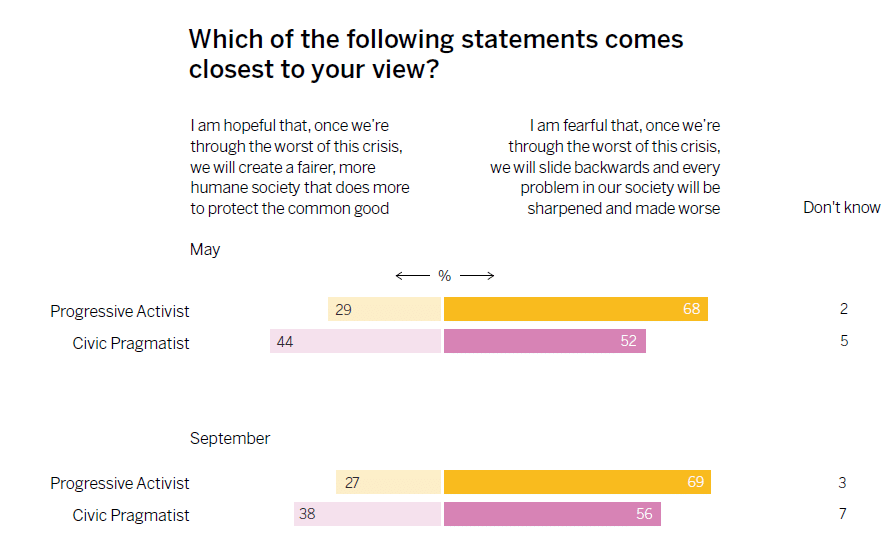
Percentage of people who are hopeful vs. fearful: Progressive Activists and Civic Pragmatists in May and September
Established Liberals
Perhaps linked to their financial position, rather than overall prioritisation of climate change, Established Liberals are slightly more comfortable than the average with the idea of prioritising climate change in the recovery from Covid-19 (68%, compared to 61% average). This increased by 13% between May and September.
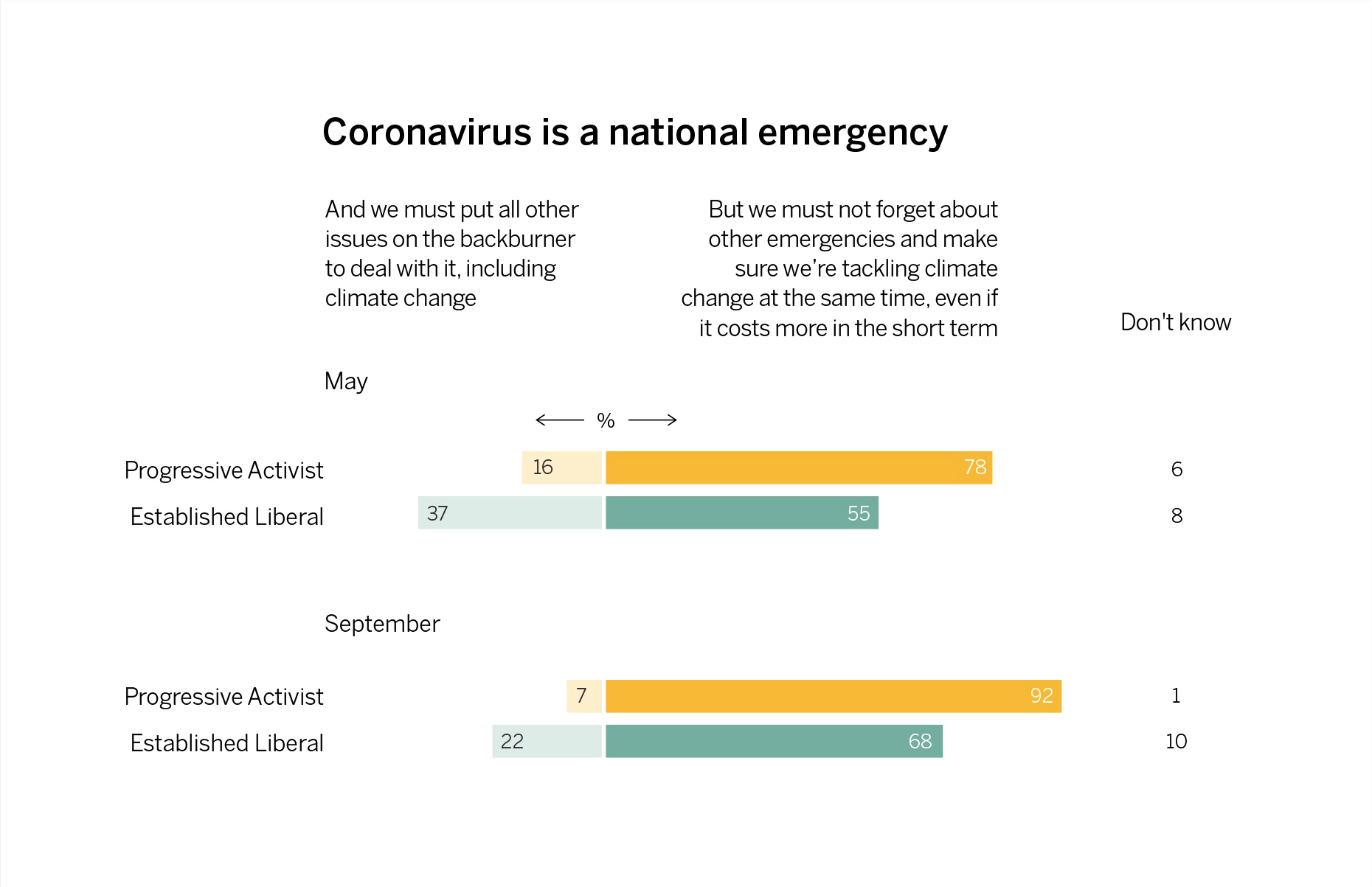
Established Liberals show some support for prioritising climate in the Covid-19 recovery
Covid taught us that as a planet we can pivot and we can pivot fast, and we can pivot effectively, and we can pivot with 80% of people following whatever that pivot is. It just needs some good global leadership, and the problem right now is in my view we don’t have the global leadership to enable us to take advantage of the opportunities that are out there to protect the environment.”
When asked about supporting a green recovery using public money, Established Liberals show a similar pattern of support. This has increased from 53% in May.
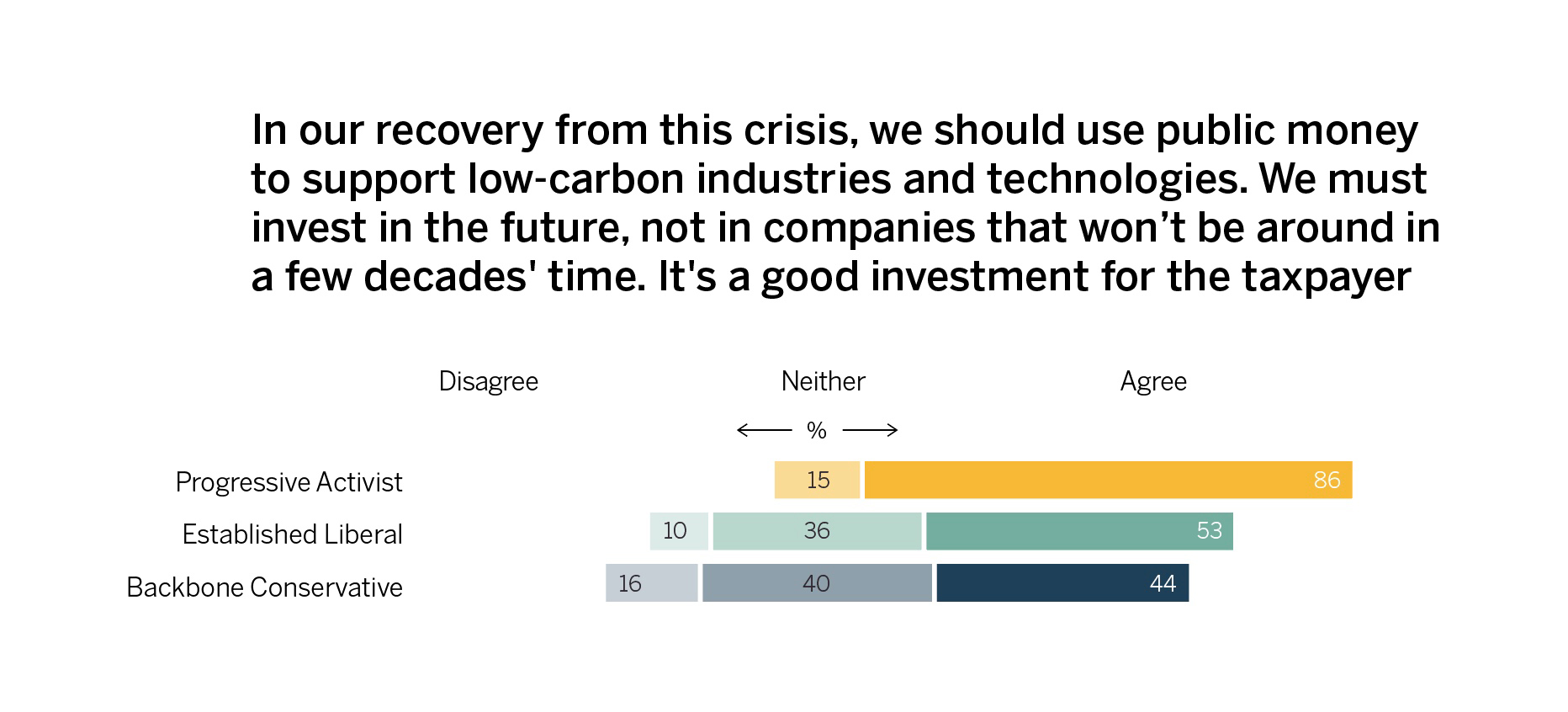
Established Liberals show some support for a green recovery using public money
Disengaged Battlers
I think all COVID-19 has done is maybe highlight everything that was broken already in our systems and now it’s just a rush to really address those.”
Although Disengaged Battlers – in common with all other segments – showed a major bump during the UK’s Covid-19 lockdown in feeling that people are more likely to ‘look after each other’, as opposed to acting in their own self-interest, this seems to have softened as restrictions have continued and economic instability has come to the fore, falling by 18% since May. They are similar to Progressive Activists in expressing the second lowest level of agreement with the idea that coronavirus has revealed the best of human nature and the second highest level of agreement that it has revealed the worst of human nature. The Disengaged Battlers have not necessarily noticed the ‘unexpected benefits’ of lockdown and are the segment most worried about not having a job to return to after lockdown ends.
When the coronavirus is all done, it’s just going to go back to normal and immediately we’re going to start damaging it all over again.”
Despite this, a slim majority (51%) agrees that climate change must be prioritised (rather than put on the ‘backburner’) in our recovery from Covid-19, even if it costs more in the short term – a striking finding given the economic insecurity and political disengagement among this segment.
There also appears to be a shift in understanding of anthropogenic climate change among Disengaged Battlers. Between February and May, Disengaged Battlers were more likely to agree that climate change is real and caused by human action (+12%), and less likely to attribute climate change to natural causes.
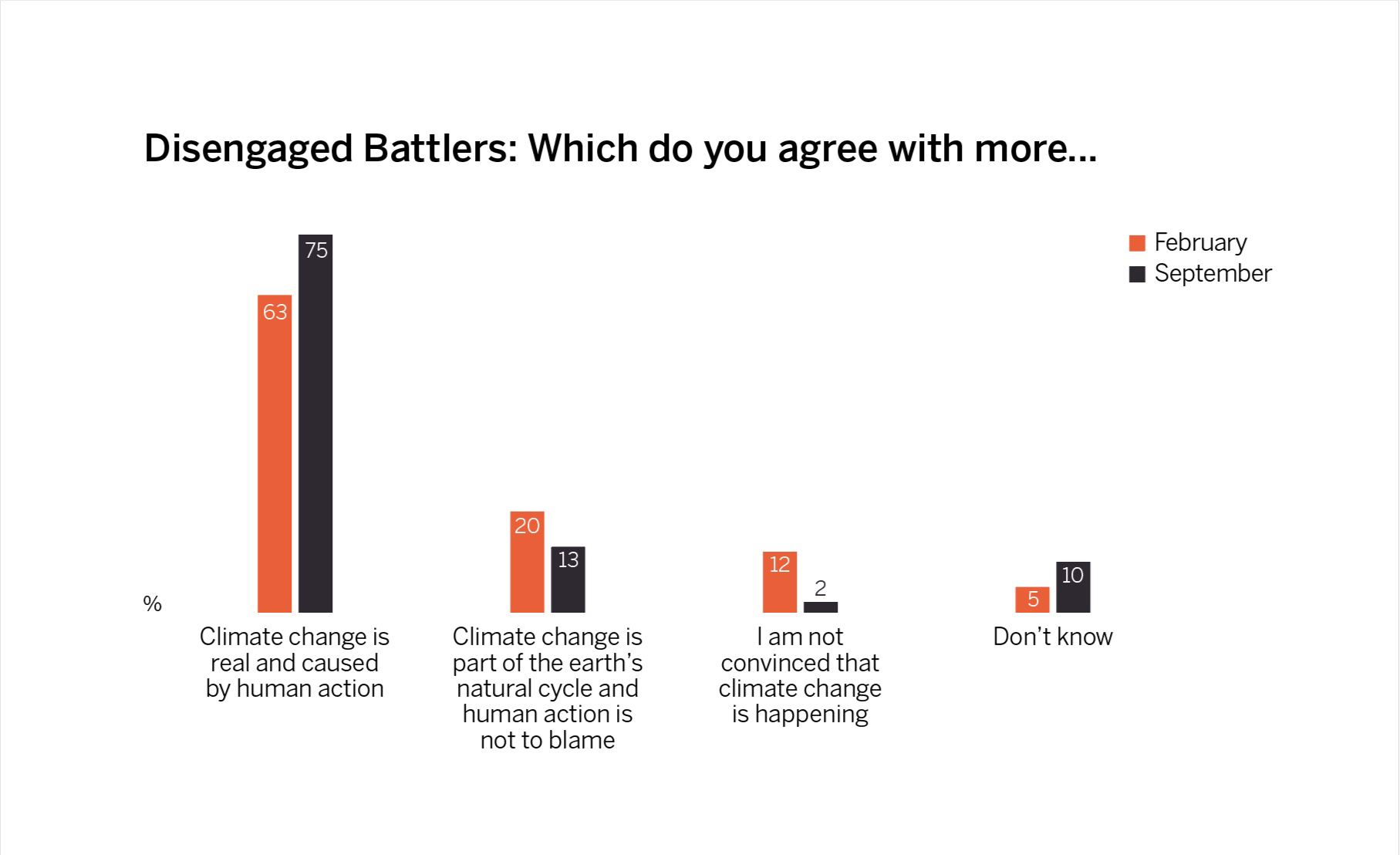
Disengaged Battlers’ understanding of causes of climate change, in February and September
Half of this segment (the second lowest, at 51%) agree with the idea that public money should be used to support low-carbon industries and technologies in the recovery from the pandemic, which emphasises that transition messages need to be about relatable people, real jobs, and human stories, rather than policy-oriented statements about investments in an industry this segment may not trust or feel a part of. They are not yet convinced that a green recovery is the way to create jobs.
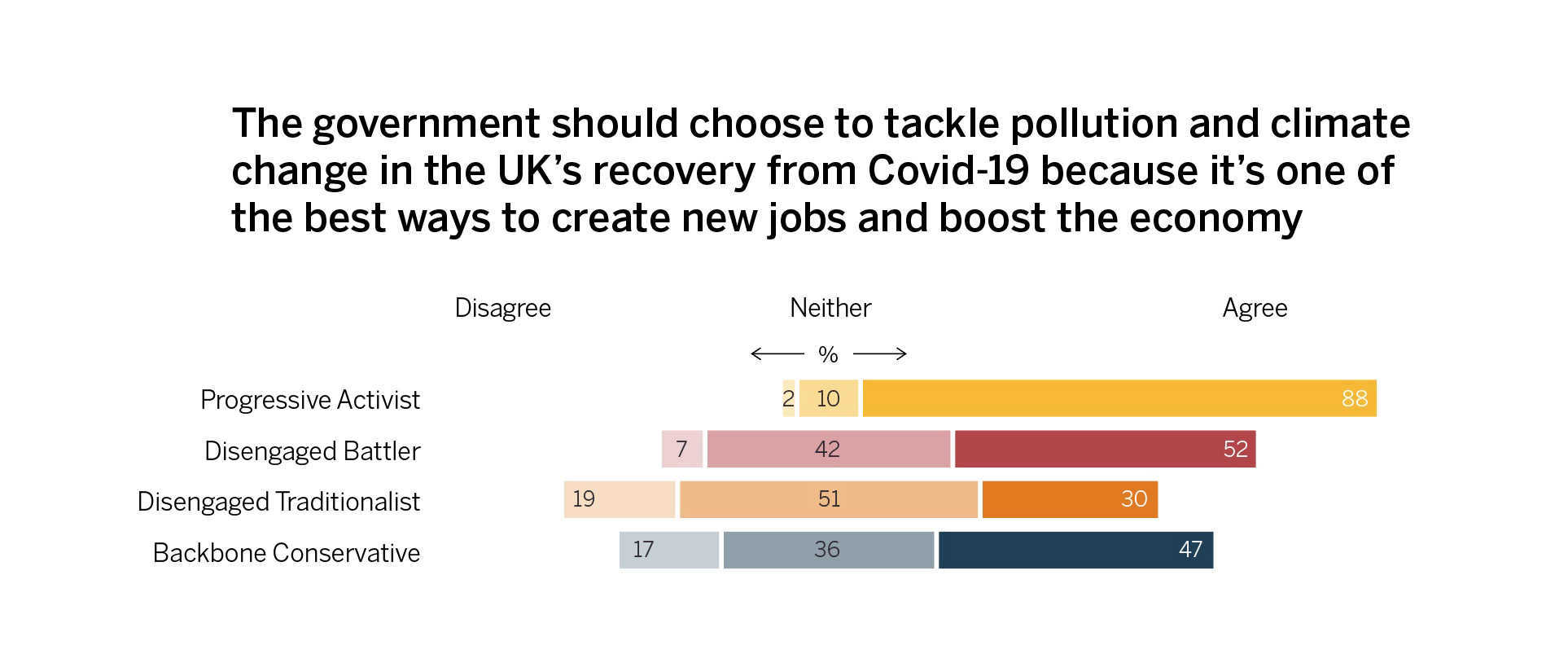
Agreement and disagreement with green recovery as a means to create green jobs
Disengaged Traditionalists
Disengaged Traditionalists may have experienced fluctuations in their scepticism about climate change as a result of the Covid-19 crisis. Polling in September suggests that since May, Disengaged Traditionalists have become less convinced that climate change is part of the earth’s natural cycle (-6%) or that climate change is not happening (-8%). These percentages have switched to feeling unsure (+14%), suggesting a greater receptiveness than before.
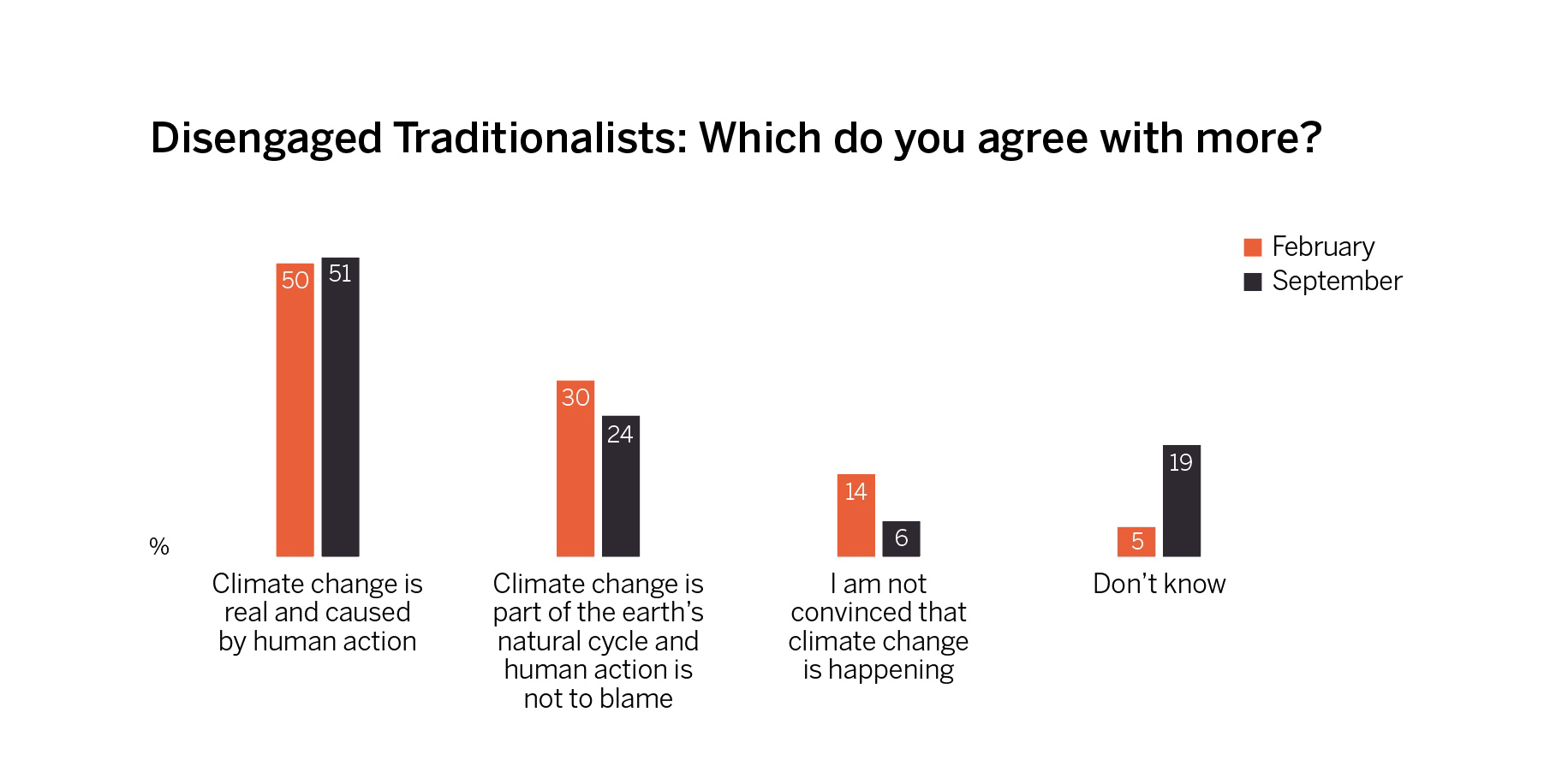
Disengaged Traditionalists’ understanding of causes of climate change, in February and September
This shift may be partly due to witnessing the environmental benefits of lockdown, alongside an awareness of the impact of collective human behaviour.
I think it’s the current crisis that’s influenced my opinion. I’m fairly convinced that we are making a little bit of a mess of the planet now, given the current crisis. Whether this virus is manmade or it’s escaped by accident from somewhere or it’s as a result of this animal market, I don’t know. It’s just made me conscious of the impact that we’re having. I used to be a bit sceptical about global warming because I heard some of the figures were fudged a bit. But I think it’s probably good practice anyway to recycle, cut carbon emissions and use more sustainable energy sources. So I’m a bit more convinced now than I was and I don’t think we’re doing a particularly great job of looking after the planet.”
I’m a bit less cynical. I still partly believe that the earth every so often goes through a cycle of climate change, i.e. that’s why we had the ice age etc., and this may be part and parcel of the cycle ... we can all see that the lack of carbon being put into the atmosphere at the moment seems to be making a bit of a difference.”
Although their understanding of the human impacts on the climate may be changing, Disengaged Traditionalists don’t necessarily feel that climate change is a priority at the moment.
I think maybe the environment issues have been pushed to the background a little bit because of everyone’s focus on the pandemic and maybe other issues, but I think when people return to normal, they will maybe continue to do things that they’ve started doing now like walking or cycling to work.”
I think a lot of people just don’t care at the moment. I think maybe one way to make people take action would be to offer some kind of incentives. So, if they contribute somehow then they would get something back for that. I think that would make people take action.”
Messages about the negative impacts of air pollution and the opportunity offered by Covid-19 lockdown policies to address these landed well across the seven segments, with 70% overall agreeing that air pollution weakens our lungs and leaves us more susceptible to diseases like Coronavirus. It stunts children’s lung growth and makes it harder for them to breathe. We should use this chance to make the air cleaner and healthier for everyone.However, Disengaged Traditionalists showed the lowest support (53%), despite being likely one of the more at-risk segments, as air pollution tends to disproportionately affect low-income groups.
They are also the least likely to agree that this crisis shows we need to work more closely with other countries and international institutions to address major challenges like pandemics and climate change (40%, compared to 61% average), likely reflecting their view that other governments should show more leadership on climate change (over and above Britain’s responsibility):
I feel [climate change has] become more important with the virus going on. I feel I’ve become more aware of it now, especially when all the traffic went off the roads in the US, China etc., and they said about how the emissions had changed in the atmosphere. It was that really, I thought it does make a difference. It would be nice if all of the countries could come together like China and the US and do things as well, but I think we’re a long way from that at the moment.”
I know there is a lot of debate at an international level around what each country is doing. I think if we spend our time arguing at that level it could always be looking at blaming other people, but we’ve all got an individual contribution to make in the here and now and I think we all need to sign up to that, whatever that looks like.”
In common with Backbone Conservatives, Disengaged Traditionalists do not view Covid-19 and climate change primarily through a prism of social injustice, and are by far the least likely (33%, compared to 62% average) of any segment to support the ‘green recovery’ language in this statement: ‘In our recovery from this crisis, we should use public money to support low-carbon industries and technologies. We must invest in the future, not in companies that won’t be around in a few decades’ time. It’s a good investment for the taxpayer’.
While they tend to show the lowest support for climate change statements, some work better than others. A majority of Disengaged Traditionalists agree that we must not become over-reliant on countries like China, and produce more in the UK by investing in renewable energy, battery manufacturing and electric cars (68%, compared to 82% average). They are similarly positive towards statements that emphasise that the outdoors has been a gift during this crisis, and we should celebrate the beauty of our countryside and show it respect (69%). A majority (62%) of Disengaged Traditionalists also recognise that the double threat of Covid-19 and climate change is putting increasing pressure on the healthcare system.
Loyal Nationals
I’ve really been rethinking my lifestyle. I think I’ve driven three times since March and I’m beginning to think that I’ve really come to enjoy the outdoors ... So, I’m really worried about what’s going to happen when society gets back to normal. What’s going to happen to the planet? It’s never, ever been my concern, but the fact that there were more birds around, that the air was cleaner, I’m really worried about are we going to get back to just, what? There was such a tangible difference made from there being no cars on the streets. Just the birds, the fauna, the flora. That has never worried me before, but now, the difference is that I think we can make a difference. Whereas before I thought it was theoretical, now I know it’s a reality.”
Loyal Nationals are more likely than the average (31%) to say that they are reassessing their priorities during lockdown (41%), and their agreement is as high as Progressive Activists and Civic Pragmatists on this statement: “If a business receives government support to get through the worst of this crisis, it should return the favour by signing up to new standards of behaviour. This means complying with tax laws, treating staff better, supporting local communities, and becoming more sustainable.”
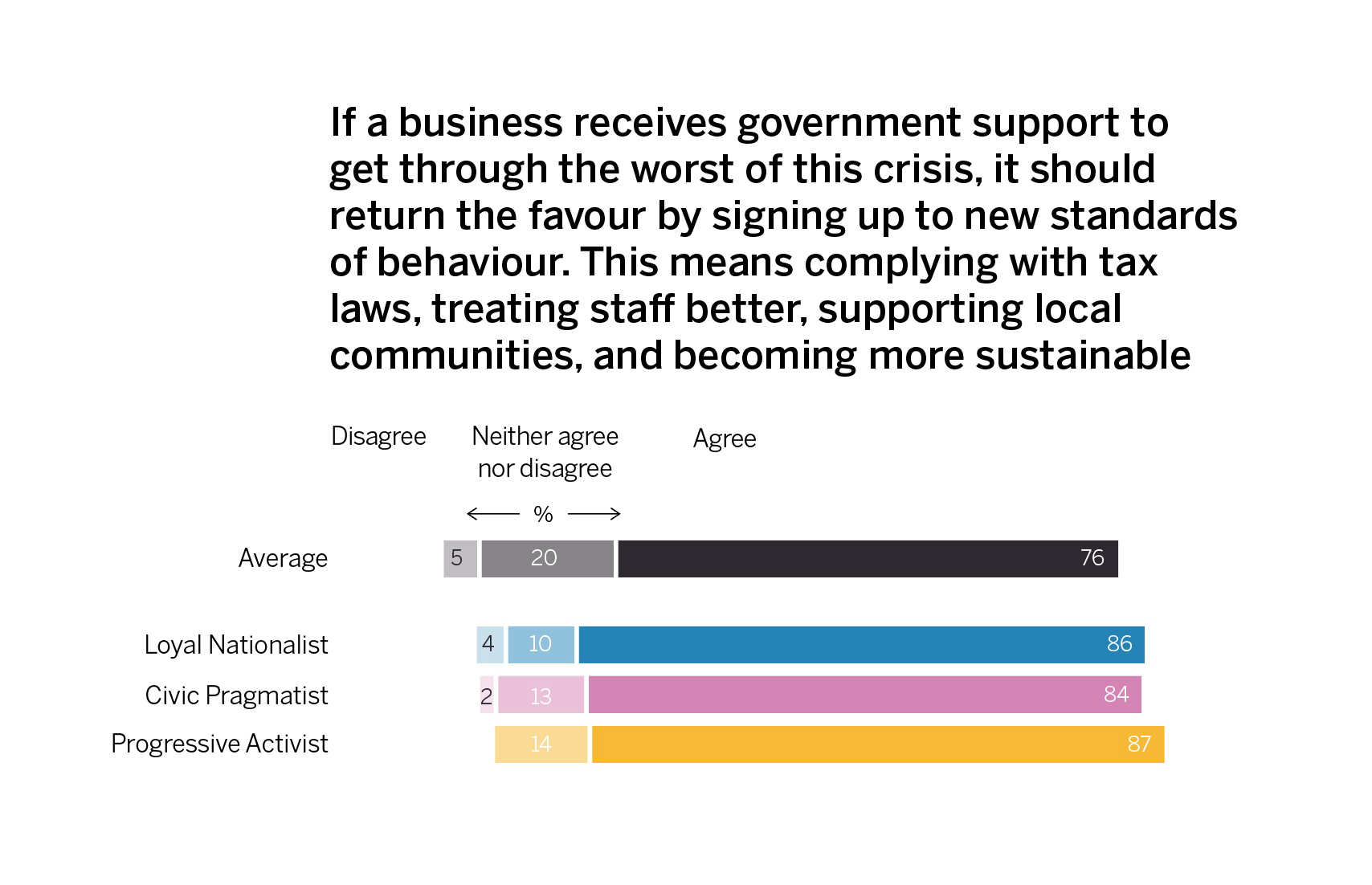
Loyal Nationals have higher than average agreement that businesses should ‘return the favour’ of government support by doing better
Loyal Nationals show less but still majority support for mandating that big businesses who receive bailouts must make changes to be more environmentally-friendly.
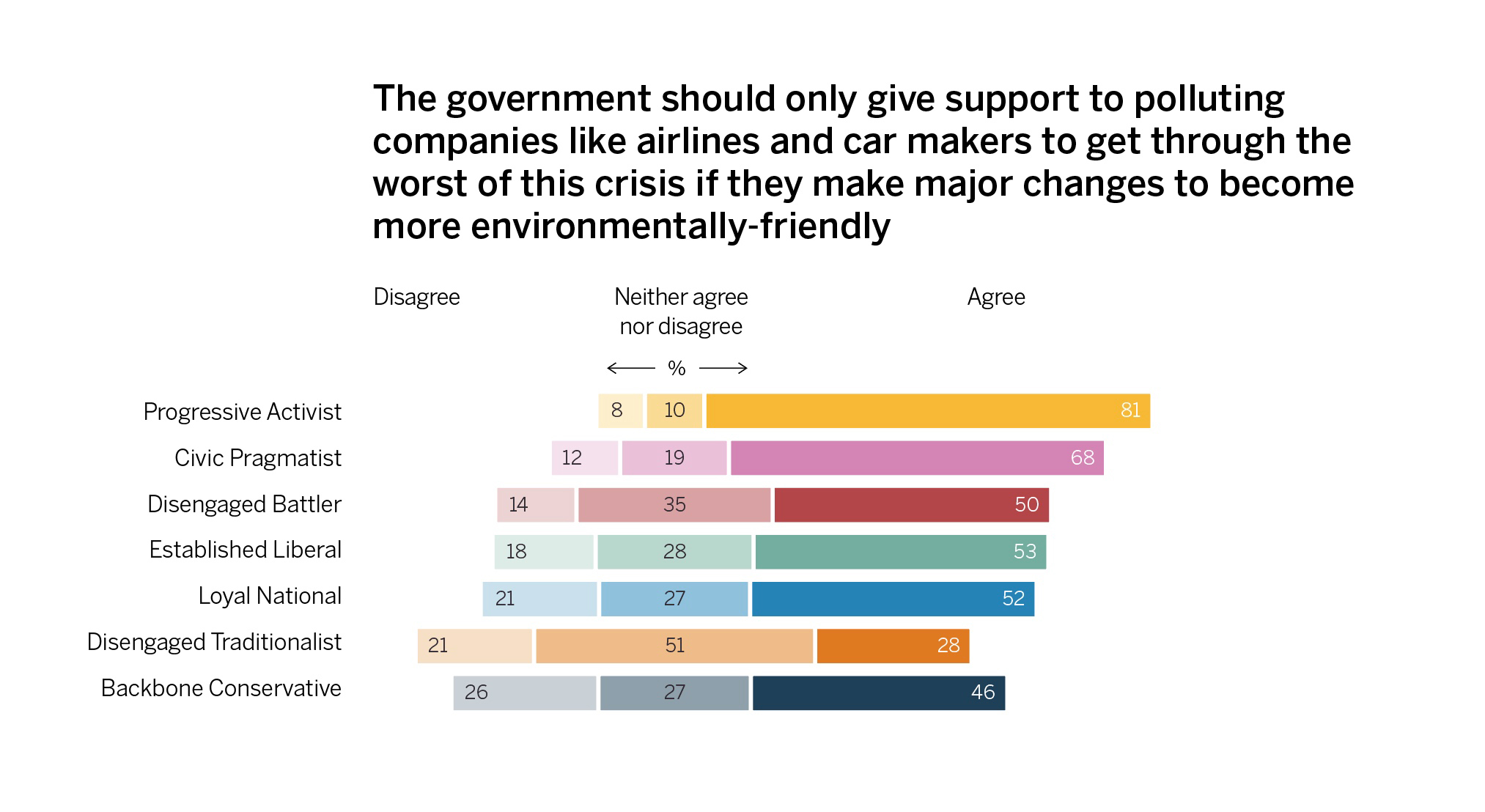
The majority of Loyal Nationals agree on conditional bailouts for big businesses
And, while their support for green recovery policies tends to be on par with more fiscally conservative groups such as Established Liberals and Backbone Conservatives, when the argument is made to reduce reliance on countries like China, Loyal Nationals show among the strongest support for investing in green industries across all segments.
Reports & guides
Continue exploring
Sign up to our newsletter
Thank you for signing up to our newsletter
You should receive a welcome email shortly.
If you do not receive it, please check your spam folder, and mark as 'Not Spam' so our future newsletters go straight to your inbox.
